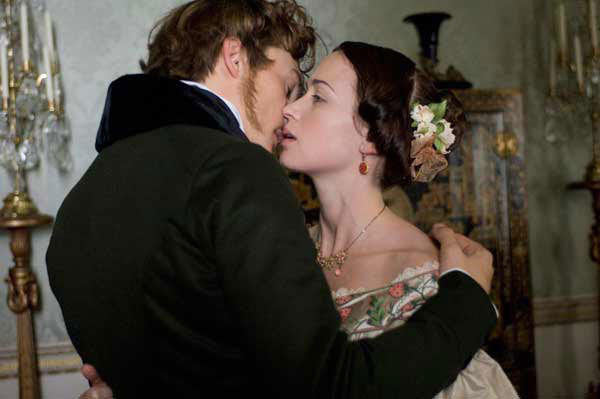 W
W ith two Elizabeth movies, Helen Mirren's The Queen, and a successful Showtime series about The Tudors, it seems a mini-genre has been created about the English royals and their saucy comings and goings and political intrigue; and especially about the way that various men close to power manipulate their Queens, and vice versa.
ith two Elizabeth movies, Helen Mirren's The Queen, and a successful Showtime series about The Tudors, it seems a mini-genre has been created about the English royals and their saucy comings and goings and political intrigue; and especially about the way that various men close to power manipulate their Queens, and vice versa.The latest entry in this genre, The Young Victoria - staring a perfectly cast Emily Blunt as the teenage Victoria, and Rupert Friend as her German suitor, Prince Albert - turns out to be a surprisingly tender and moving rendition of the form.
In the Victorian age (1837 - 1901) we're placed somewhere between the bloody intrigue of Elizabeth/The Tudors and the modern polite protocols of today's British Queen, so don't expect any heads to roll or battles to be raged in this outing. In fact, the Victorian era was Britain's high point of peace and prosperity, and the filmmakers are actually quite sly to make a film about the young queen rather than the old, for this is a tale of young hearts and true desire, yet while using the name of a woman ultimately associated with an age of fastidious virtue.
The young Victoria - the little girl being raised as a princess and heir to the throne in the early 1800's - is actually a precocious, lively spirit who is trapped herself in a world of repression by an overprotective mother and her scheming minister, Sir John Conroy, who wishes Victoria to sign the order that would make him official regent upon the death of the King. Victoria stubbornly refuses, innately distrusting Conroy, and knowing that her future is at stake.
It's not too difficult to discern Conroy's character given the way he treats Victoria's dog: variously coddling or kicking depending upon his mood. The dog becomes a stand-in for Victoria herself (a nicely used form of metonymy), and it may be with you - as it was with me - that the affection for dogs in this movie eventually softens your heart, and draws you even closer in to the character's fears and desires.
Even though they are royals, the schemes by various Kings and Uncles to have their way with Victoria's royal powers are portrayed with the kind of boisterous of feuding families - replete with birthday-party embarrassments and nuptial snubs. Only one man, it seems, has Victoria's true interests in mind. That man is the young, handsome Prince Albert, who even as he wins Victoria's heart, still must convince her that he's also worthy of her trust.
It actually surprised me, in the end, how the movie takes a turn away from historical melodrama towards passionate love story. This Queen is perhaps more than those that have come before someone our modern selves can relate to: a younger sister, perhaps, who must learn how to take her place in a dangerous world amongst self-interested family, and decipher with whom she can fully open her heart. Blunt wins us over into the dilemma of the character (as does Rupert Friend as Prince Albert), and even if the movie doesn't quite follow the official history, the ending becomes surprisingly moving, as any story of young people finding true love, told with feeling and felicity, ultimately can be.
It's interesting, then, that a movie genre with such a background of intrigue, social station, and politics ultimately becomes about something else: about the dynamics of young love, and how new lovers, who may be, in fact, the most inspired people on earth, can support the best in each other. It's a bit of a turn from where we started, with plots and contrivances to control the heir and manipulate the throne. But then, perhaps this is like the drift of the Victorian age itself, becoming less about power than about symbolism: and in the case of Victoria and Albert, symbolism for finding the goodness in other people, and using our station to improve the world.
And yes, I admit, I did get weepy in the end. But to be honest, I couldn't tell whether it was the love story, or simply sadness at how our current political life, dull and ruthless as it is, so misses such inspiring figureheads: both their stubborn courage, and their bright idealism.




No comments:
Post a Comment
Note: Only a member of this blog may post a comment.